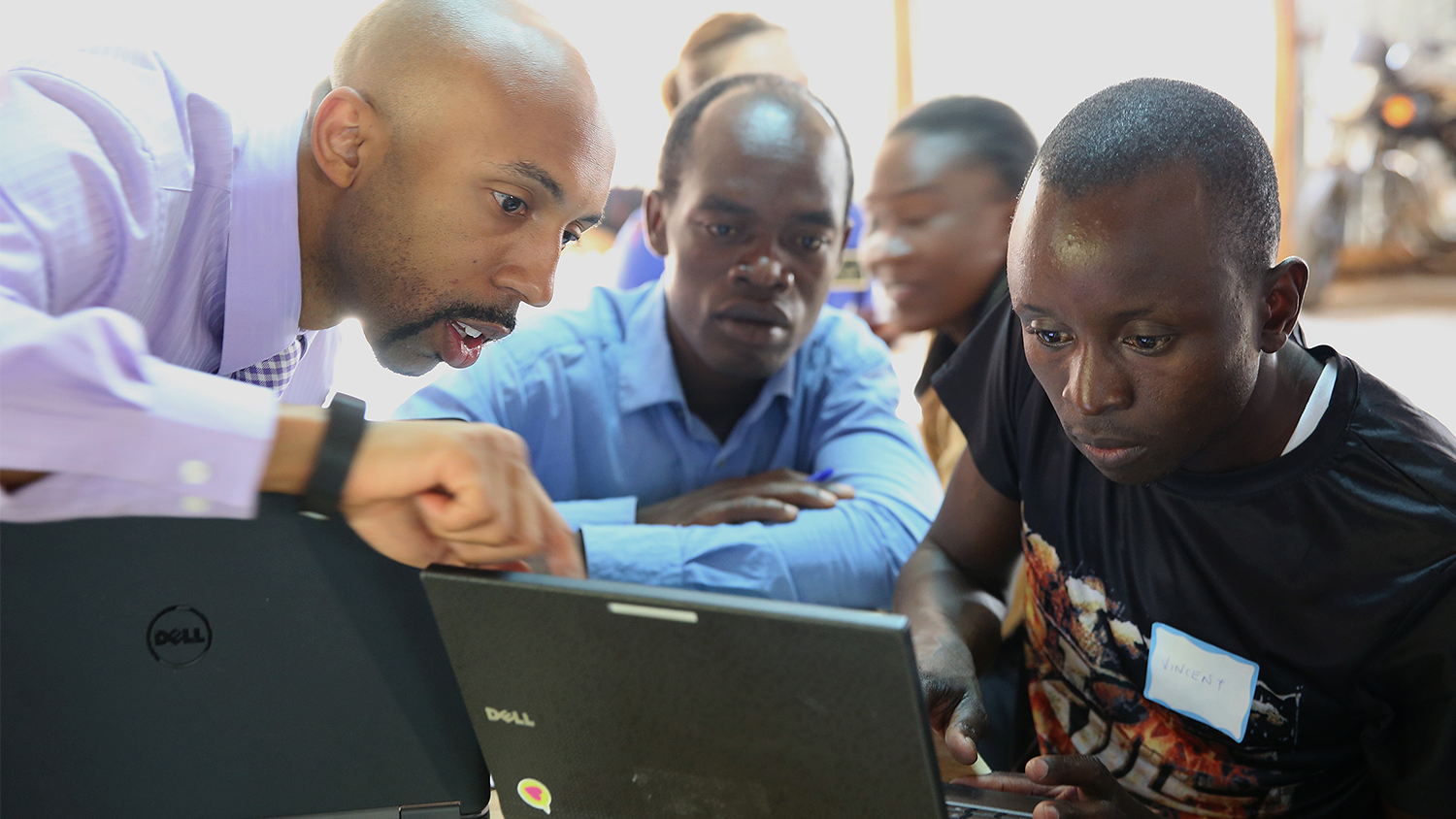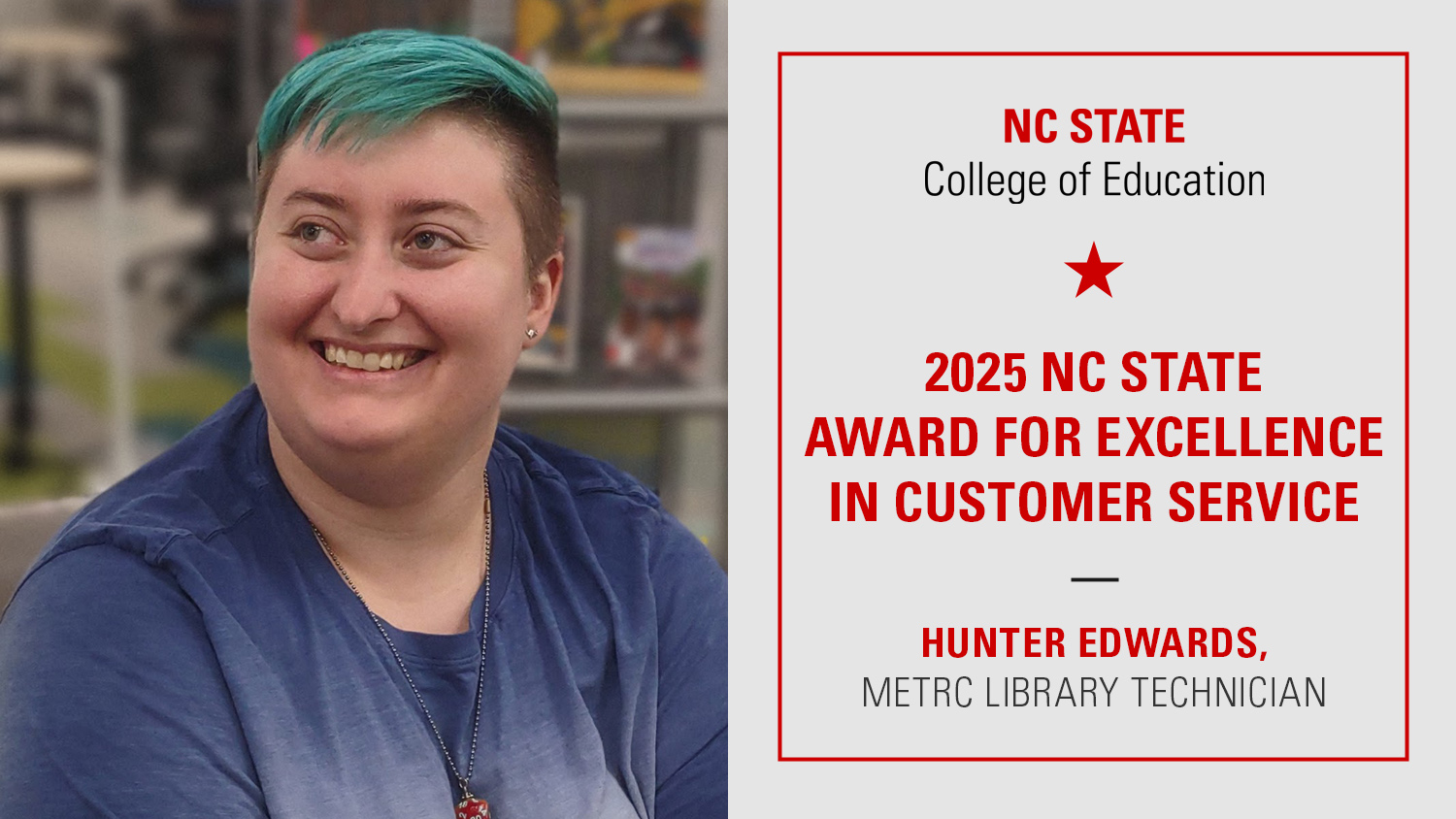DeLeon Gray on his iScholar Project and the Importance of Belonging-centered Instruction: ‘The Concept of Belonging is So Fundamentally Human…It Has the Potential of Serving as the Connective Tissue Among All of Us’

When DeLeon Gray, Ph.D., an associate professor of educational psychology and equity, and a University Faculty Scholar at NC State University, was volunteering with Durham Public Schools in 2012, he developed iScholar as a way to support students in improving their research skills. Eight years later, with $1 million in funding from the National Science Foundation, the program has evolved into a way to improve students’ sense of belonging by empowering them to contribute to the social and physical conditions in their schools and communities.
The iScholar team is an interdisciplinary community of educators and researchers who are firmly committed to making schools a place where all students want to be and want to learn. Through a school-university-community partnership, historically marginalized students use a research-based approach to help improve the world in which they live.
[spotlight-box label=”” img=”” heading=”Read More About DeLeon Gray’s Work on Belonging in Schools” cta=”” url=””]
Associate Professor DeLeon Gray, Ph.D., has been involved in several projects over the past two years that focus on the importance of belonging in school, particularly among Black students. Take a look at some of his other recent work:
[/spotlight-box]
“We want them to be informed citizens who participate in a democratic society. It would be difficult to do that without empowering them to understand how their role as citizens is something that matters right now,” Gray said. “There’s no timestamp on being a citizen who makes the world a better place; it doesn’t start when you turn 18. By giving them these tools early, it invites them to question their role and assert their power and agency in creating a better tomorrow for society.”
Students involved in iScholar collaborate on meaningful projects and speak to issues they identify within their communities while developing a sense of belonging through after school environments that support the development of mastery goals. The program is also developing a coherent set of instructional practices for teachers and community stakeholders that target motivational needs specific to adolescents in Durham, North Carolina.
Gray, who studies the importance of belonging in school and the ways in which adolescents interpret social encounters in achievement contexts, said that the construct of belonging is present in some form in nearly every motivation framework in educational psychology. What he aims to do through his research and projects is to create a perspective that is cultural in nature and pluralizes the conversation around motivation and belonging to honor and affirm historically marginalized students.
“The concept of belonging is so fundamentally human that regardless of who you are and what you look like, it is a concept that has the potential of serving as the connective tissue among all of us so that we can really see each other not as data points, but as human beings first,” Gray said.
iScholar students at Neal Middle School in Durham demonstrated the importance of belonging in school in spring 2019, when they won first place in a national design competition by designing a school that honored students’ cultures and fostered a sense of belonging in all students.
The iScholar team’s victory for the design — which was created using both research on belonging as well as a place-based approach that accounted for the context of the Durham region — is one of several successes the project has had since receiving funding from the National Science Foundation in 2016.
“I’ve always liked school, but the competition made me realize that school can give you more opportunities than the traditional ways of learning things. I also learned that school is more effective with a teacher that wants to reach the students,” said one Neal Middle School student who participated in iScholar. “Working with a professor like Dr. Gray also gave me access to learning more about research, the research he has done and how I can do research on my own.”
One of the biggest impacts the project has had over the past several years, Gray said, has been on policy and practice both locally and nationally.
Locally, iScholar has provided support in bringing district-led community initiatives to life. This includes the LEADurham program, an online platform launched in the summer of 2020 and designed to help grow students’ skills in advocacy work and educate teachers on how to tackle tough conversations inside and outside the classrooms.
Initiatives like LEADurham and the design competition, Gray said, are important because they show historically marginalized students that there is a way to achieve at high levels scholastically while also making a social impact. It is a lesson that has become increasingly important as the world continues to grapple with the ongoing challenges related to the coronavirus pandemic, which has disproportionately impacted communities of color, and the increasing calls for an end to systemic racism and racial injustice.
“These larger societal issues are on students’ minds. If schools ignore these issues, then we’re not being authentic and we’re not connecting the information that we want to teach students to their current knowledge structures,” Gray said. “As we fold in these types of experiences, we position our students as consultants who will lead us. The more we listen to our students, the more we’re in a position to develop solutions that are relevant and have the potential to be the most transformative.”
Additionally, the partnership between Durham Public Schools and NC State has inspired several teachers to enroll in the College of Education to grow their knowledge through advanced degrees. Gray said that “top-notch” teachers from the district have begun to pursue their doctoral degrees at NC State, which has enabled the educators to continue to give back and helped the iScholar team become more attuned to serving the needs of local teachers.
[spotlight-box label=”” img=”” align=’left’ heading=”Learn more about the NC State College of Education’s Educational Psychology Program” cta=”” url=””]
Faculty at the NC State College of Education are transforming the field of educational psychology through unique conceptual and methodological approaches to the study of race and culture, with focuses on school climate, issues related to student engagement and motivation and cross-disciplinary applications of the work beyond educational psychology.
The NC State College of Education offers both a Master of Science or Master of Education in educational psychology as well as a Ph.D. in Teacher Education and Learning Sciences in the educational psychology program area of study.
Learn more about a master’s degree in educational psychology
Learn more about a Ph.D. in educational psychology
[/spotlight-box]
“I believe that Dr. Gray created a space where educators felt a sense of belonging in an academic space. This had a major impact on the decision that teachers like me made to pursue an advanced degree,” said Joanna Ali ‘24PHD, who enrolled in the educational psychology program area of study after working with iScholar. “Now that we are doing research around belonging, we are able to do research that translates theory into practice. As community engaged researchers, we understand our insider and outsider positionality and are able to navigate partnerships with first-hand knowledge of what is needed to impact belonging in schools that serve marginalized youth.”
Nationally, other districts have taken notice of the iScholar work and reached out to Gray and his team for support, guidance and insight on how to structure their own schools to honor and affirm historically marginalized populations.
Ultimately, Gray said, he hopes that iScholar can serve as a model for how to use participatory methods to partner with schools, communities, leaders and parents in similar environments to create place-based solutions to their own issues.
“We’re empowering students to contribute to the social and physical conditions in which they live, but the real secret sauce is that we’re teaching students research skills and methodological approaches that give them the lens and the tools that they need to analyze their conditions and to innovate to better conditions,” he said. “The principles of how our activities and our programs are designed can be extracted and applied in their own way to contexts that mirror the urban teaching and living conditions that the communities we serve currently operate in.”
Motivating Students to Succeed: Two Tips from DeLeon Gray, Ph.D.
Treasure what you measure: “If we are committed to honoring and affirming all students inside of our learning spaces, then we need to check in with them about the extent to which they are feeling accepted, respected, included and supported within these environments and do it frequently enough to be able to respond almost in real time to these needs.”
Flexibility is key: “Teaching is a dynamic process and each class of students is different from other classes of students. It’s important for educators to make space to be able to react to the information that students are giving them through their body language, through what they wear, through how they speak, to what they care about, to where they sit so that the teachers can leverage these different meaning systems and integrate that with content in a way that makes students feel like the environments they’re in are built for them.”
- Categories:


